‘Living’ Pelvis in the Guinness Book of World Records
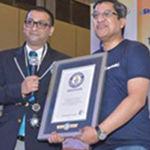 Shashank Akerkar, MD, an ACR fellow and rheumatoid arthritis specialist at the Mumbai Arthritis Clinic and Research Center in India, found a unique way to draw attention to ankylosing spondylitis (AS). He persuaded 425 patients, mostly those suffering from AS or affected by lupus or rheumatoid arthritis, to stand under one roof in the shape of a pelvic bone. Besides reaching his goal—to raise awareness about the autoimmune disease—the photo of the event was also entered in the Guinness Book of World Records.
Shashank Akerkar, MD, an ACR fellow and rheumatoid arthritis specialist at the Mumbai Arthritis Clinic and Research Center in India, found a unique way to draw attention to ankylosing spondylitis (AS). He persuaded 425 patients, mostly those suffering from AS or affected by lupus or rheumatoid arthritis, to stand under one roof in the shape of a pelvic bone. Besides reaching his goal—to raise awareness about the autoimmune disease—the photo of the event was also entered in the Guinness Book of World Records.
“We created the largest human image of a human bone,” says Dr. Akerkar. “No one has done something similar, to the best of our knowledge. We chose to portray the pelvis, because AS affects the sacroiliac joints,” he says.
The goal was to raise awareness of AS and reduce the average six- to seven-year delay in diagnosing this disabling arthritis. “Patients pay the price of the delayed diagnosis in terms of disability,” says Dr. Akerkar.
Thanks to social media, people from all over India participated. Bollywood comedian Johny Lever joined in to help boost attendance. After the event, a symposium for AS patients was held.
The Study of Pain
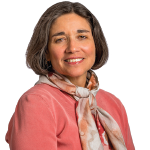 A research scientist at the Shirley Ryan AbilityLab (formerly known as the Rehabilitation Institute of Chicago), Linda S. Ehrlich-Jones, PhD, RN, is studying behavioral interventions for people with chronic pain, including those with rheumatic conditions.
A research scientist at the Shirley Ryan AbilityLab (formerly known as the Rehabilitation Institute of Chicago), Linda S. Ehrlich-Jones, PhD, RN, is studying behavioral interventions for people with chronic pain, including those with rheumatic conditions.
Between 2005 and 2010, she collaborated with Rowland Chang, MD, MPH, a professor of medicine at the Feinberg School of Medicine at Northwestern University, Chicago. The pair studied the effects of motivational interviewing, a counseling approach that includes open-ended questions, affirmations, reflective listening and summarization. The overall goal was to empower people with rheumatic disease to problem solve and set and accomplish goals to become more physically active.
Since then, Dr. Ehrlich-Jones has developed a survey tool that gages patient perceptions about motivational interviewing when conducted by non-clinicians, such as health coaches. Do patients find it helpful? The survey will help her identify how this counseling approach needs to be changed or fine-tuned.
As a former recipient of the Addie Thomas service award from the ARHP, Dr. Ehrlich-Jones still volunteers for the Arthritis Foundation—but now in a limited capacity—to increase awareness of rheumatic conditions and help patients find ways to become more active.
“My research is ongoing,” says Dr. Ehrlich-Jones, who earned her doctoral degree at the University of Illinois. “I’m hoping to determine what the best approach is to work with people with arthritis to help them be more active.”
Dr. Oatis Studies the Role Physical Therapy Plays in Functional Outcome
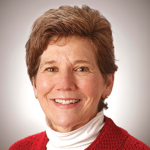 For nearly 40 years, Carol A. Oatis, PT, PhD, a professor in the physical therapy department at Arcadia University in Glenside, Penn., and past ARHP president, has been studying patients with rheumatic diseases. Early on, her research applied mechanical analysis to better understand movement and movement disorders. Working with individuals both with and without osteoarthritis, she has explored new ways to measure knee joint stiffness, discovering an association between this measurement and patient complaints.
For nearly 40 years, Carol A. Oatis, PT, PhD, a professor in the physical therapy department at Arcadia University in Glenside, Penn., and past ARHP president, has been studying patients with rheumatic diseases. Early on, her research applied mechanical analysis to better understand movement and movement disorders. Working with individuals both with and without osteoarthritis, she has explored new ways to measure knee joint stiffness, discovering an association between this measurement and patient complaints.
Over the past decade, her research has shifted toward the factors that influence variable functional outcomes and the role physical therapy plays in that variation.
“We need to find out how to best apply physical therapy services with rheumatic diseases,” says Dr. Oatis, who earned her doctoral degree from the University of Pennsylvania in 1982. “There is ample evidence that exercise helps people with rheumatic disease. But we don’t know the best amount of exercise, dosage or intensity of exercise.”
With help from a three-year grant from the National Institute of Arthritis and Musculoskeletal and Skin Diseases, Dr. Oatis is now working with other researchers in the department of orthopedics at the University of Massachusetts to examine physical therapy practice variations used on patients with knee replacements and their effect on patient care.
She says rheumatologists need to understand that physical therapy has its own practice variation, just like other disciplines. The treatment that one patient might receive from one physical therapist could vary greatly from another. She says not every patient with the same rheumatic disease gets the same treatment.
“We’re documenting that variation and hope to identify the variations or practices that work best for people with rheumatic diseases,” she says. “By recognizing that variation, we hope to be able to identify the elements that could contribute to a standard intervention.”
Dr. Ellen Gravallese Receives ASBMR Stephen M. Krane Award
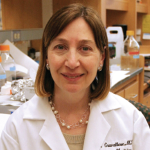 Ellen M. Gravallese, MD, was recently named the 2017 Recipient of the esteemed ASBMR Stephen M. Krane Award. The Stephen M. Krane Award is given in recognition of outstanding achievements in basic, translational or clinical research in inflammation and/or skeletal matrix biology. Dr. Gravallese’s basic science laboratory is dedicated to the study of the pathogenesis of inflammatory arthritis, with a particular interest in the fundamental mechanisms of joint destruction. Research in her laboratory has identified key molecular and cellular pathways in rheumatoid arthritis and contributed to the development of new therapeutic agents for treatment.
Ellen M. Gravallese, MD, was recently named the 2017 Recipient of the esteemed ASBMR Stephen M. Krane Award. The Stephen M. Krane Award is given in recognition of outstanding achievements in basic, translational or clinical research in inflammation and/or skeletal matrix biology. Dr. Gravallese’s basic science laboratory is dedicated to the study of the pathogenesis of inflammatory arthritis, with a particular interest in the fundamental mechanisms of joint destruction. Research in her laboratory has identified key molecular and cellular pathways in rheumatoid arthritis and contributed to the development of new therapeutic agents for treatment.
In December 2016, Dr. Gravallese was named an associate editor of the New England Journal of Medicine. Her main responsibilities include overseeing the review process for manuscripts in rheumatology and several other disciplines. “I am thrilled to be joining the editorial team at NEJM, having worked in medical editing for my entire career,” she stated in the school’s press release. “This position will allow me to participate in some of the most exciting and impactful work in the field of medicine.”
In addition, Dr. Gravallese continues serving as the Myles J. McDonough Chair in Rheumatology, professor of medicine and chief of the Division of Rheumatology at the University of Massachusetts (UMM) Medical School.
Since last year, Dr. Gravallese has also been preparing for the role of ACR president. After sitting on the ACR’s Executive Committee as the College’s secretary for two years, she will serve as president-elect for one year and then be named ACR president in November 2019.
She received her medical degree from Columbia University College of Physicians and Surgeons and completed her residency and fellowship at Brigham and Women’s Hospital, Harvard Medical School, Boston.
Dr. Gravallese began her career as a scientist interested in rheumatoid arthritis. She conducted research at Harvard Institutes of Medicine and Beth Israel Deaconess Medical Center, where she joined the Harvard Medical Faculty Physicians as an associate professor of medicine at Harvard Medical School.
As a graduate of the Hedwig van Ameringen Executive Leadership in Academic Medicine program at Drexel University, she is dedicated to preparing senior women faculty at schools of medicine, dentistry and public health to move into leadership positions.
Dr. Antony Rosen Moves Precision Medicine Forward
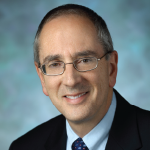 As vice dean for research and director of the Division of Rheumatology at the Johns Hopkins School of Medicine, Antony Rosen, MD, says the world of medicine has entered a new era of precision diagnosis and precision treatment, according to an article published by the Center for Innovative Medicine at Johns Hopkins.1
As vice dean for research and director of the Division of Rheumatology at the Johns Hopkins School of Medicine, Antony Rosen, MD, says the world of medicine has entered a new era of precision diagnosis and precision treatment, according to an article published by the Center for Innovative Medicine at Johns Hopkins.1
As a leading advocate of precision medicine, he explains, “This enormous web of interconnected things” has dramatically changed the way healthcare practitioners analyze data, recognize patterns, absorb information and make decisions.
“That remains our calling, to bring science to the caring practice of individuals with disease, for prevention, monitoring, therapy and cure,” says Dr. Rosen. “The tools of the modern era are greatly affecting our ability to accomplish those goals, and that’s what we are calling precision medicine.”
For example, he says not all patients with certain diseases are alike. Recognizing the subtype of a disease a patient has will lead to customized treatment.
“If you have a group of 100 people with the same disease, they really should be divided into homogeneous subgroups,” says Dr. Rosen. “It’s important to identify these subgroups and understand what the disease mechanisms are that impact them in specific ways.”
Clinicians at multidisciplinary Centers of Excellence are already engaged in such practices. By recognizing subgroups and studying patient blood and tissue samples, Dr. Rosen says they will “discover mechanisms that underlie (each patient’s) disease, with the hope of finding targeted treatment.”
Dr. Rosen conducts research on the shared mechanisms of the autoimmune rheumatic diseases, including Sjögren’s syndrome, scleroderma, lupus, myositis, rheumatoid arthritis and vasculitis. His laboratory currently focuses on two areas: defining the properties of autoantibodies that allow them to induce cellular or molecular dysfunction, and amplify injury of specific tissues in different rheumatic diseases; and understanding the mechanisms underlying the striking connections between autoimmunity and cancer, which may uncover events that drive autoimmune diseases.
Rheumatologist Named Associate Dean at Penn State College of Medicine
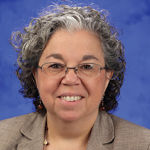 Barbara E. Ostrov, MD, was named associate dean for faculty and professional development at Penn State College of Medicine last fall.
Barbara E. Ostrov, MD, was named associate dean for faculty and professional development at Penn State College of Medicine last fall.
Dr. Ostrov started working at the Milton S. Hershey Medical Center and College of Medicine, Penn State, in 1991. At that time, she was the second adult rheumatologist at the institution. She founded the Division of Pediatric Rheumatology and has served as division chief for pediatric and adult rheumatology. Now, there are six adult rheumatologists and a fellow, plus five pediatric rheumatologists and a fellow.
She continues her clinical work as a pediatric rheumatologist, having given up adult rheumatology in 2014. She sees children and young adults up to their mid-20s. Most of the young adults have been her patients since they were children.
Alongside her clinical work, she “develops programs to help junior, middle and full faculty reach their goals,” in her role as associate dean, she says. She says part of her job is to get “people interested and excited about the field,” says Dr. Ostrov, as well as “training in education leadership, helping researchers develop leadership in their labs.” She also works with the faculty affairs office regarding diversity and inclusion within the faculty; specifically advocating for “women, doctors of color and the disabled.”
She says part of education leader development is learning to how to balance clinical and teaching duties, and how to avoid burnout while mentoring younger faculty.
When she was an intern, she says, “the patients made me realize what a great field rheumatology was. How good it was to make a difference in people’s lives. And now it’s an amazing time to be in the field.”
Benjamin J. Smith Honored for Work on eBytes
 For more than 18 months, Benjamin J. Smith, PA-C, DFAAPA, served as the scientific editor developing online, module-based courses, called eBytes, on behalf of the ARHP. The courses on osteoarthritis and rheumatoid arthritis went live on the ARHP website earlier this year. The ARHP would like to recognize Mr. Smith, who is a past president of the ARHP, for his excellent work on this project.
For more than 18 months, Benjamin J. Smith, PA-C, DFAAPA, served as the scientific editor developing online, module-based courses, called eBytes, on behalf of the ARHP. The courses on osteoarthritis and rheumatoid arthritis went live on the ARHP website earlier this year. The ARHP would like to recognize Mr. Smith, who is a past president of the ARHP, for his excellent work on this project.
Each course consists of three modules—pathophysiology, clinical manifestations and treatment—and combines video, audio, text and quizzes, explains Mr. Smith. He says the dual goal of the courses is to attract more clinicians to the field and increase knowledge of health professionals of rheumatic conditions.
“Rheumatology is an underserved specialty,” he says, adding that individuals who complete each 30-minute module earn one-half CME credit or 1.5 credits per course. “There’s a tremendous need for more rheumatology health professionals and also a need for people to be aware of rheumatology and have that knowledge base.”
The courses are a free benefit for ACR and ARHP members. Nonmembers can access the courses at $50 per module.
Mr. Smith, who received his PA degree from the Medical College of Georgia in 1999, serves on the teaching faculty in the College of Medicine, School of PA Practice, at Florida State University and is also the school’s director of didactic education. As a former ARHP president (2011–12), he raised the organization’s membership to its highest level in history and was also the first member to serve on the ACR Executive Committee.
Carol Patton is a freelance writer based in Las Vegas.
Ann-Marie Lindstrom is an independent writer and editor based in the Tucson, Ariz., area.



